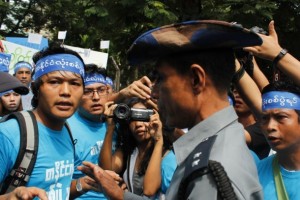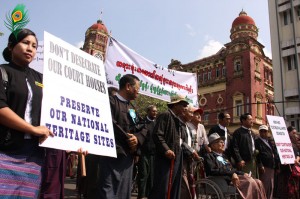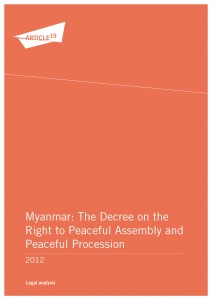Posts Tagged ‘Freedom of Assembly’ (61 found)
Burma/Myanmar: New Forms of Control and Threats to Freedoms of Expression, Assembly and Association Amidst Reforms Fanfare
An international fact-finding mission was conducted by Asian Forum for Human Rights and Development (FORUM-ASIA) on 24- 30 October 2012 to assess the situation of freedoms of expression, assembly and association in Burma, against the backdrop […]
• • •Burma: Rights Abuses Endanger Reform
Government’s Commitments to Change Falling Short
Burma’s human rights situation remained poor in 2012, despite some noteworthy actions by the government to adopt rights-respecting reforms, Human Rights Watch said in its World Report 2013 released today […]
• • •Freedom House Condemns Crackdown on Peaceful Protesters in Burma
Freedom House condemns the violent crackdown against peaceful protesters at the Letpadaung copper mining site in Sagaing Division, Burma and calls on the government of Burma to immediately halt its use of violence and arbitrary detention against peoples exercising their right to peacefully assemble […]
• • •Burma: Continued Violations of Fundamental Freedoms and New Forms of Control Expose the Empty Façade of Reforms
Human rights protection in Burma will remain illusory if fundamental freedoms of expression, assembly and association are not properly safeguarded in the current legal reforms in Burma, warned the Asian Forum for Human Rights and Development […]
• • •Keep Human Rights on the Agenda for Burma
 This week Tomás Ojea Quintana, the Special Rapporteur on the situation of human rights in Burma, presented his latest report to the United Nations General Assembly (UNGA) that will adopt, in a few weeks, its annual resolution on the situation of human rights in the country.
This week Tomás Ojea Quintana, the Special Rapporteur on the situation of human rights in Burma, presented his latest report to the United Nations General Assembly (UNGA) that will adopt, in a few weeks, its annual resolution on the situation of human rights in the country.
Since the lifting of sanctions and the renewal of diplomatic ties with the Burma government by many foreign countries, the UNGA resolution is one of the last tools remaining in the hands of the international community to encourage the government to turn the preliminary changes of the last year into more concrete democratic reforms.
Despite recent developments in Burma, the root causes of armed conflict still haven’t been addressed and human rights violations are ongoing, serious and prevalent throughout the country.
This week, the violence in Arakan State errupted again with more than a hundred victims in a week. Meanwhile, fighting in Kachin State continues and Mr. Quintana said in his press statement, “I have received allegations of attacks against civilian populations, extrajudicial killings, sexual violence, internal displacement, torture, forced labour and portering, as well as the ongoing use of landmines and the recruitment of child soldiers, by all parties to the conflict.” […]
• • •No More Than a Semblance of Freedom of Assembly, Association and Expression
 Like many of Burma’s other reforms including the easing of restrictions on media, there is a darker side to the semblance of freedom of assembly, association and expression that has recently been commended in Burma.
Like many of Burma’s other reforms including the easing of restrictions on media, there is a darker side to the semblance of freedom of assembly, association and expression that has recently been commended in Burma.
President Thein Sein’s office has been urging ministries to remove some 4,000 people remaining on the blacklist. However, some returning exiles have been asked to sign agreements that they will not do anything that could “harm the state.” The agreement says that exiles can repay the government’s “generosity” by avoiding actions that would disrespect the government and not participate in actions or publish anything that would harm the country’s stability, which hark back to language used by the military regime.
Within the country, lawyers, activists, farmers and local villagers have been protesting on a range of crucial issues including land confiscation, mining projects, electricity shortages, the preservation of cultural heritage buildings in Rangoon and the need for nationwide peace. Those who speak out on issues that are sensitive to the government are detained, charged or threatened by authorities. One of the biggest cases at the moment is that of the thirteen organizers of the peace protest on 21 September who are facing court cases in 10 different Rangoon townships for protesting without permission. They are required to appear at court hearings nearly every day and must inform the authorities if they plan to leave Rangoon […]
Not in Theory, Not in Practice: Freedom of Assembly and Association in Burma
The rights of peaceful assembly and association in Burma are fragile at best. The Burma government has enacted reforms to address this gap in human rights protection. Sadly the reforms are lacking and citizens are regularly denied any semblance of protection in relation to international human rights standards.
The Unlawful Associations Act1 and the NGO Registration Law haven’t been repealed; these remain large obstacles if Burma is to have freedom of assembly and association […]
• • •Burma: Peaceful Protest Organizers Charged
Western Countries Should Challenge Government to Uphold Basic Freedoms
The government in Burma should drop charges against activists following peaceful demonstrations on International Peace Day in Rangoon on September 21, 2012, Human Rights Watch said today. Thirteen activists face possible charges for violating the country’s 2011 public assembly law for leading a march of some 1,000 demonstrators calling for peace in Kachin State and elsewhere in Burma. The government has already charged two ethnic Kachin participants in the march for the alleged offense in multiple courts […]
• • •The Decree on the Right to Peaceful Assembly and Peaceful Procession
 The Decree on the Right to Peaceful Assembly and Peaceful Procession is one of the first laws governing civil and political rights to be adopted since the election of a quasi-civilian government in November 2010. ARTICLE 19’s analysis of the law finds the law to be inconsistent with the right to freedom of expression and the right to assembly.
The Decree on the Right to Peaceful Assembly and Peaceful Procession is one of the first laws governing civil and political rights to be adopted since the election of a quasi-civilian government in November 2010. ARTICLE 19’s analysis of the law finds the law to be inconsistent with the right to freedom of expression and the right to assembly.
In the analysis, ARTICLE 19 appreciates the Decree’s recognition of the state’s duty to protect assembly participants. However, the requirement for permission to hold an assembly, the grounds for denying permission, the lack of a court appeal and the absence of guarantees for media access to assemblies are problematic and must be urgently revised […]
The International Community Must Support the People of Burma in Their Efforts to Exercise Their Rights
“We’re still on strike. We are fighting for our rights, because we want to be treated fairly” said a female worker representative from the Tai Yi shoe factory in Rangoon, on Wednesday. It has now been more than a week since nearly 2,000 workers went on strike because of the factory’s refusal to pay them for the five days they were prevented from working during Chinese New Year.
“We are being forced to get off our own land and the company is threatening legal action against us. So we have authorized someone to act on our behalf in filing a lawsuit against Khin Shwe” said Kyaw Sein, a farmer who lost 50 acres of land, talking to the Irrawaddy this week.
Farmers from Rangoon’s Mingaladon Township said that they will sue Khin Shwe, the chairman of Zay Kabar Company and a member of the Lower House of Parliament, for allegedly confiscating their farmland […]
• • •








 All posts
All posts